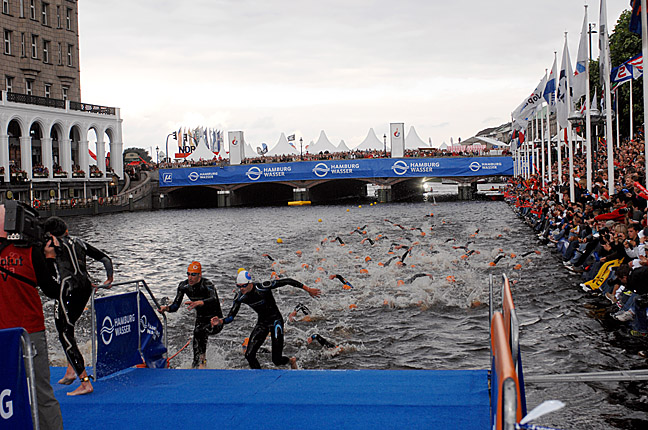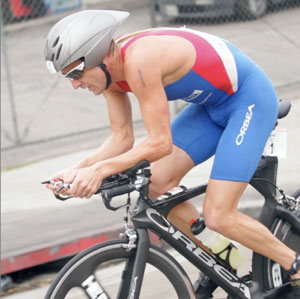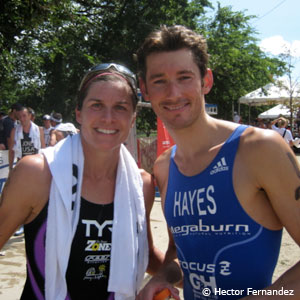Sitting down with 3-time Life Time Fitness Series champion Greg Bennett
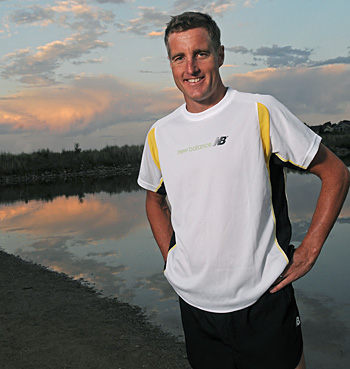
Just what do you do to follow perfect five-for-five at the 2007 Life Time Fitness series that garnered a total of half a million dollars in prize money? Greg Bennett, who looks a little like an Aussie movie star playing a handsome, heroic but doomed soldier in Gallipoli, has learned the hard way to treat glory and defeat as twin impostors they are. In terms of sport, he joined Chris McCormack, Brad Beven, Emma Carney and Jackie Gallagher as unlucky favorites to lose form and miss the inaugural Aussie Olympic team. But instead of sulking, Bennett signed on with coach Lance Watson and became the training partner who helped push a then-unknown Canadian kid named Simon Whitfield to a 24-carat Olympic gold medal upset. In addition to that reflected glory, Bennett met the ravishingly beautiful and talented Laura Reback at Watson’s Victoria, British Columbia training camp and they married soon thereafter.
In the following seven years, Greg and Laura became their own dynamic coaching team guiding one another to the best seasons of their careers. Laura Bennett won four ITU World Cups, four ITU World Championship medals, the $200,000 top prize at the inaugural Hy-Vee Triathlon, and took home a bittersweet 4th place at the 2008 Olympics. Greg was the ITU world number one ranked Olympic distance triathlete in 2002 and 2003, winning the ITU series championship in 2002 and taking gold in six ITU World Cups altogether. In 2004, he took a 4th at the Athens Olympic triathlon. Staking a claim to be the most versatile Olympic distance triathlete, he found success in the North American non-drafting classics, winning the first three lucrative Life Time Fitness series championships, following his perfect 2007 with a much tougher victory in 2008.
Perhaps the best testimony to Bennett’s integrity and the loyalty he inspires came from Simon Whitfield after his stirring come-from-behind silver medal run at Beijing: “When I got dropped on the last lap, I wasn’t sure I could bridge back to them. The only thought I had was – Benno has this beautiful tempo run. He is very graceful, very compact. So I had this one image: Be Benno, Be patient. Tempo yourself back up. I ran that scenario and it brought me back.”
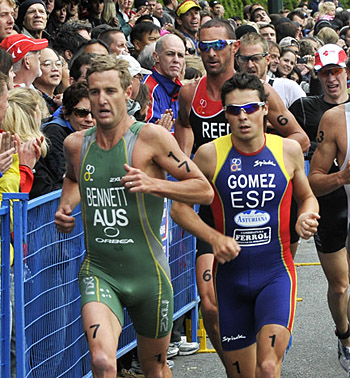
Slowtwitch: How did you approach the 2008 season after your perfect run at the Life Time Fitness series in 2007?
Greg Bennett: Obviously after ‘07 I recognized that was a remarkable year. To go undefeated and get the super bonus prize money made it a very special year. So I knew coming into ’08, it would be difficult to compare to ’07. So like '07, I just took it one race at a time.
ST: What were the nuts and bolts of your preparation for the season?
Greg: Over time I have learned to be very patient early in the year. When you start training early in the season, patience is the key word. I think Laura and I have a lot natural power, speed and agility. It’s nice to have these weapons but it’s very dangerous when the body is not ready for it. The trick is to be gentle and bring the body up slowly. That means putting the ego aside early in the year. For me, the first 4-5 months of the year are all about patience. Basically, that is how I’ve prepared for the last 4-5 years.
ST: You might have added to – or deflected – the pressure of a Life Time Fitness series three-peat by taking a shot at the Olympics. It must have been a high when you were selected, but was it painful when Australia fell out of the top eight nations and lost the third start spot for Beijing?
Greg: It was a funny year. To make the team in March, and have friends and family celebrate the fact I would be off to the Olympics again, and then to be off the team in June after Australia lost it's third spot, was a whirlwind of managing everyone else's emotions.
ST: Was your initial decision not to try for a second Olympics a good one? Was your decision to change your mind and try for it worth it?
Greg: I focused very much in ‘07 to support Laura getting into her Olympics team. She had missed out in 2004, then had continued success in World Championships. I wanted to be there emotionally and wanted her to make the Olympic team. Then I had to finish my run at the Life Time Fitness series in ‘07, and win all the races. Once I did that, I realized that the Aussie men’s Olympic team had one spot wide open. I asked Bill Davoren (the High Performance Director) what did I have to do to make Olympics team? He said we have two or three important World Cups left – Mooloolaba in March and a number of others scattered in the weeks after that. I said I will race Mooloolaba but I will only be in pre-season conditioning shape. If you like what you see, then I would like to be considered for the team.
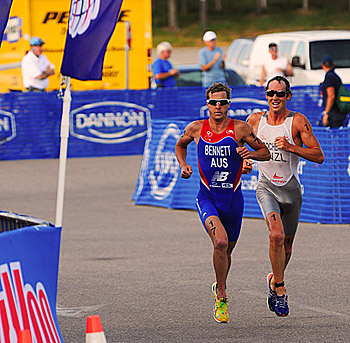
ST: How did it go?
Greg: I had a duel with Bevan Docherty for 5th. It was a strong race, but not fantastic. I explained to Bill that you can’t peak that early in the year and expect to contend for a medal at the Olympics in late August.
ST: So they put you on the team. Great!
GB: It was great to be chosen to represent again, but it came down to the Aussies qualifying as a nation and being placed among the top eight nations to earn three Olympic slots. When we fell out of the top eight, it came down to Vancouver. Bottom line: If I got on the podium there, I’d be on the team. Failing that, if Brendan Sexton beat the Russians and the US men, I’d be in. At end of the day I had a terrible performance at the World Championships as I had not prepared enough for the cold conditions. My muscles were completely locked down.
ST: Then you spent a lot of time repeating to concerned fans and family that you weren’t feeling so bad about the Olympics?
Greg: I had chosen my path for '07. I had chased the dream of winning all five LTF events and earning the super bonus and for this I have no regrets. Because I had this success in '07 I was able to deal with the disappointment of not making the team easier then the people around me.
ST: Then you bounced back nicely when you returned to hot weather?
Greg: After Vancouver, I had 2-3 weeks to prepare for Hy-Vee. I had a good day and made the podium (3rd) and Laura had a good a day and took fourth. After that, I had 3 weeks to prepare for Minneapolis the first race of the Life Time series. Of course I was very focused on that.
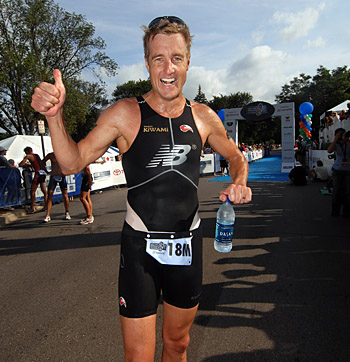
ST: How was the Minneapolis Life Time Fitness for you?
GB: I had a good race. I had outrun Simon Whitfield, Andy Potts and Hunter Kemper at Hy-Vee. I was confident I would have a strong race at Minneapolis. Halfway through the run, it was between myself, Simon and Andy. Right around 8km, I got massive cramps in my stomach muscles. When they cramped on me, I had to slow up a little, otherwise I felt fantastic. I was third but beaten by two athletes I have enormous respect for.
ST: It seems you had an effective pep talk with Simon Whitfield after he pulled out of the New York race?
Greg: He had won Minneapolis and been in the thick of things at Hyvee. He is like my younger brother and I can't help but want to talk things through with him. Obviously withdrawing from a race never does much for one's confidence, especially 4 weeks out from the Olympic Games. I basically told him that he had a fantastic coach with Joel Filiol and that Joel had gotten him fit and strong, but with 4 weeks to go he had to listen to his instincts and not loose his head. It was important that he manage the taper into the Games as that is one of the hardest things for a coach to get right.
ST: How did you feel after your win at New York?
Greg: When I won New York, I felt very fortunate to be back on top of the podium. It's an event I have won now for the last three years and it's a course that truly suits my skill sets.
ST: What was after NYC?
Greg: I headed to Beijing. Laura left before me and I was going over in a support role. There was not much I could do by then. At this stage, Laura’s talent and ability to taper and rest are unmatched.
ST: How did Laura perform with her foot issues which prevented her from biking her normal amount?
Greg: She had done plenty of running and swim training, I’d done some workouts with her before the Olympics, and I was confident in her run. We focused on Laura having the Olympics experience, and that to us, meant the Opening Ceremony and all that surrounds it. You are there to represent your country and do your best by friends and country and be a part of the greatest sporting spectacle on earth. You do not treat it like a one day triathlon. She did that and more. She had a fantastic time with teammates and USA Triathlon put a fantastic team together — in that sense she has no regrets. Laura went in and enjoyed the Games from Opening to Closing Ceremonies.
ST: So how did she stay so competitive?
Greg: She did all she could after fighting foot problems for 12 weeks. On race day she might have been a fraction off, perhaps one point of one percent. But to beat Vanessa or Emma you cannot overcome that.
ST: So is this the end?
GB: Absolutely not. We are looking at London, 2012, and as we prepare our program we will treat it as a gold medal or nothing approach. We’ve both had the Olympic experience, both ended up with 4th place finishes. That’s put fuel in the belly. In leading up to 2012 we will obviously continue to focus on the key USA events and the World Championship series.
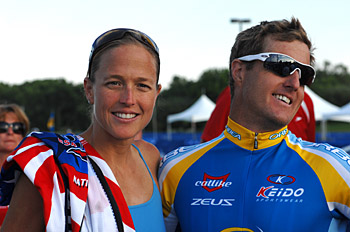
ST: So you were proud of her 4th place finish?
GB: I was over the moon. I’ve never seen an athlete deal with adversity like Laura did that 12 week period.
Any other athlete I know would have 'spit the dummy'. She changed her training program and I actually stepped back a lot and let her take full control of her training. Her belief in herself grew and grew. She was not able to bike and was severely limited in her training. She did all she possibly could and it was incredible to watch the intensity of her focus.
ST: Were you surprised by Emma Snowsill’s dominance?
Greg: We knew Emma would win. Vanessa, we figured should come 2nd unless something went wrong. Nothing went wrong for either of them and they both had fantastic races. Laura had a great race all things considered, but that is sport, a lot of the training is managing.
ST: How intense was it to be there in person?
Greg: Actually I was commentating for the BBC, and I was in the Beijing broadcast center studio 90 minutes away from the venue. It was an absolute thrill for me. I really enjoyed it — at same time I had to be even handed, and make sure I was only biased toward British athletes.
ST: What about Helen Tucker? After Vancouver, was her Beijing race a letdown?
Greg: Helen Tucker was at an incredible peak at the end of May, beginning of June. If you actually look at the story of her year: she travels to South America in Dec, Jan to get points so she can race world cups with the British team. She raced Mooloolaba and New Plymouth World Cups and finally got a good enough points to make the start at Madrid World Cup which was the British Olympic trials. Then she gets second at Madrid and makes the Olympic team and then she was asked to race worlds to help Liz Blatchford get enough points to make the Olympic team. She ended up winning Worlds. But ultimately she had to race too hard too long to maintain until Beijing. Helen had to prove herself over and over again. So I was not surprised that made her Olympic chances a bit harder. But what a fantastic season she had, even with a disappointing Olympics
ST: Making the start at the Chicago round of the Life Time Fitness series was hard?
Greg: Laura enjoyed the rest of Olympics and had a good time in Beijing. I flew directly back to Chicago to race that weekend following the Games. That was one of those things, I truly didn’t want to be there. I was exhausted from the travel. I hadn’t trained for a few weeks. I had been focused more on Laura than myself. I just wanted to get home and get back into a training routine. I definitely hadn’t done any swimming. So I went to Chicago on an early flight. I had to go to be eligible for the series championship. At the end, I had an OK day. I finished second to Stuart Hayes. All things considered, it was a good day.
ST: Your odyssey never got simple.
Greg: Now Laura comes back from Beijing and she is very sick. A lot of athletes came back with a flu virus from the Olympics. I got it as well, and that made it tough going into the LA race, the 4th of the series. Again, I was feeling as I did at Chicago. Man, I should not be here, but in Life Time Fitness, you must start all the races. Although you don’t need to finish. I was really sick, coughing up phlegm balls. I could not make it a running race as I had to keep my heart rate low, and I had to power the pedals in a big gear on the bike to keep my heart rate down, otherwise I could not breathe.
ST: How did the race develop?
Greg: I came out of the water roughly a minute behind Andy Potts, Stuart Hayes and a majority of the men's field. I finally caught the final two leaders at 25k and had a pretty good rhythm and entered T2 with a 25-30 sec lead on the bike. I was able to maintain on the run without having to really drop it down another gear. I was able to hold it at a high intensity without coughing up a lung. The split for the run was 31:19 which was OK for that course on that day.
ST: Dallas was the showdown at the OK Corral?
Greg: Interesting scenario going into Dallas. Andy could still win, Stuart Hayes could still win the series. Basically, whoever won the Dallas race would win the series. Dallas was double points.
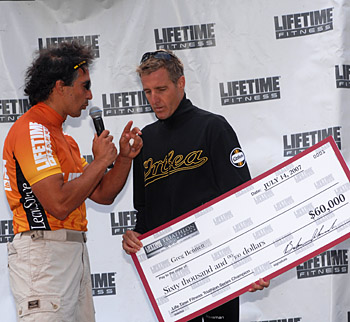
ST: What was your strategy?
GB: I really wanted to win Dallas, but knew Stuart and Andy were very strong and that would make it very tough for me. The swim at Dallas was so fast I remember sitting on Stuart Hayes feet, I remember saying to myself , 'this is not a choice, you must keep sprinting, I must keep up with these guys,' and so I got out of the water and Andy Potts and Courtney Atkinson were only 30-40 seconds in front. I had to catch them as quickly as I could. I caught Andy by about 8k and I thought we were away from any chasers. But the large group caught back up towards the end of the bike.
When I got off on the run I had no idea the group caught us, I thought I was just racing Andy Potts. But at the 1 km mark we ran past the finish line before heading out on a long out and back I heard the announcer run through the field of men right behind me. Here comes Potts and Stuart Hayes and the whole other crowd. 'Oh man, I better get going!' I managed to have a very strong run. I ran a 30:25. I measured it a few times on by my bike cyclometer. Actually I believe it was about 80 meters short… so maybe a 30.35 would be more accurate.
ST: How did it turn out?
Greg: I won by 40 seconds in the end. Andy Potts was second, Stuart Hayes came third, a strong field of guys. I had to give it all to win. It was one of the hardest races to win in my career. And they don't get any easier.
ST: You won $60,000 at Dallas and $60,000 for the series title and cleared about $200,000 for the year? That includes Hy-Vee and other races?
Greg: We decided many years ago. I’m a professional athlete and as a Professional I must focus on making the right financial decisions. Of course, its nice to win certain events and get plenty of pats on the back by fellow athletes, family and friends. But these events often don't make financial sense. I believe the best professional athletes will go where the money is and the quality of field at these events is 2nd perhaps only to the Olympic Games.
ST: Now you are a dominating man in the sport, do your sponsors match your prize money?
Greg: I feel fortunate for the sponsors we have. But I believe many companies are having to really be careful of marketing budgets until we see an upturn in the economy. The way the economy is now, it’s going to be tough for everybody — race directors, pros, and all athletes it’s gonna be difficult period in pro triathlon.
ST: Who are your sponsors?
GB: Orbea, Kiwami, New Balance (Japan), Oakley, Aquaman, First Endurance, and Hed Wheels have been fantastic equipment sponsors. They have done very well by us. Sponsorships are not a pot of gold. I feel blessed with what we do have. But it does not let us rest on our laurels. We must still pick the right events and believe in ourselves to earn income. Ultimately, we back ourselves. We are pros and we want to compete in the richest prize money purse races.
ST: When are you traveling to Australia?
Greg: Boulder has become our home. We are building a house here and it will be done by April. We are looking at 9 months here and 3 months in Australia. We enjoy getting back a little bit. I love to see my family for a few weeks and enjoy starting the year off there. We live in a pretty quiet town in Noosa, north of Brisbane.
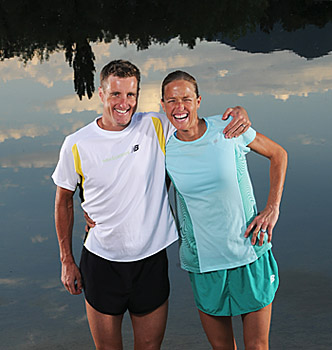
ST: What is the measure of triathlon greatness?
Greg: I think we all approach sport differently, and what we consider great. I’ve heard people say they want to be a complete triathlete, which made me think a little about it. To me, the complete athlete does not get beaten. To another, it means he can do all the distances and do them well, and to another it means you do all three disciplines well but in a single distance. It’s made me think about what the term, means. I respect the guys who do all the distances, but I believe in mastering one distance. So I’ve focused on the power events. I’ve done well, but I do not believe I’ve mastered it.
ST: What do you think about the new ITU World Championship series format?
Greg: The ITU have changed and chosen to make a series decide who its world champion shall be. Finally, triathlon will decide its world champion like surfing does. Their most prolific world champion, Kelly Slater, is the athlete that can win and be consistent at the top of his game for 8 of 12(I think) very different surf contests and is the world champion through consistency and different waves. Now Triathlon will have its world champion be the person who can win consistently over varies courses and different conditions. In 2002 and 2003, I was number 1. I always felt to be able to be successful over hilly, flat and hot events or whatever to show your versatility within the same sport of triathlon was equally important to me than the one off day. With so many variables within the sport, you do not necessarily find the best athlete on one day. I believe that is best determined within a series. That is why you look at Javier Gomez. When he won the series he proved he truly is the world’s best. Now you have a one off cracker at worlds, but that is not what makes him world best. In fact, it is his ability to consistently able to win big events through the year. For me, I say pick a one off one day challenge and the Olympics Games – that is it. That is the one day event. Otherwise the ITU is doing a fantastic thing.
ST: What about losing the tradition of a one day World Championship?
Greg: Look, there’s a lot to be said for someone who can peak for a one off race. But, to determine who is the best Triathlete in the world, I believe they are someone who is winning consistently all the time. They are someone we all get to know and know well.
ST: Who is the better coach, you or Laura?
Greg: Together, I believe we make the worlds best individual coach. We each have our strengths. Mine is the planning and detailing the day to day program. Laura's is the tapering, recovery, nutrition, and some "feel' type feedback. I could not win Dallas without Laura taking over my taper 2 weeks out. This year, I was skating on edge leading into Dallas. I had to work very very hard, there comes a point when enough is enough with the hard work. Its time to get yourself ready mentally and emotionally, to let body defuse and be ready to race. Laura has an incredible feel and awareness for fatigue of the body and knows when to rest. We are one coach, it is not a question of who is better.


